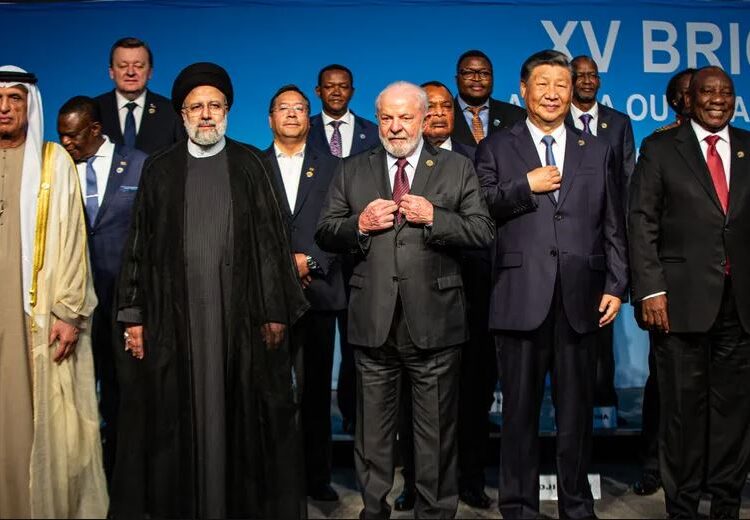Will the champions of the anti-apartheid movement in South Africa offer support to Palestine in its struggle against Israeli apartheid? South Africa, currently holding the rotating presidency of BRICS in 2023, is set to convene an emergency summit of BRICS member state leaders today to address the situation in Palestine and the ongoing Gaza conflict.
The virtual summit is expected to be attended by leaders from BRICS member states, namely South Africa, Brazil, Russia, India, and China, as well as representatives from new BRICS members Iran, Saudi Arabia, Argentina, Egypt, Ethiopia, and the United Arab Emirates.
Following opening remarks by Cyril Ramaphosa, the President of South Africa, delegates from BRICS members and the invited countries are scheduled to deliver speeches addressing the humanitarian crisis in Gaza. The participation of UN Secretary General Antonio Guterres is also anticipated, with a joint statement expected to be issued by the summit participants.
Ahead of the summit, the South African president reiterated support for Palestine. Additionally, during a recent meeting between China and Arab foreign ministers, there was an emphasis on the immediate cessation of hostilities in Gaza.
Although BRICS has previously expressed support for Palestine, the current situation presents a new challenge. The stance of BRICS at today’s summit will serve as a significant test for the group’s position, particularly in light of the discussions at the Johannesburg meeting in August 2023. In their final statement, the BRICS members expressed concern regarding the dire humanitarian conditions in occupied Palestine and called for direct negotiations between Israel and Palestine based on international law, the Arab peace initiative, and the two-state solution.
The leaders of the BRICS nations underscored their unease about the deteriorating humanitarian conditions in Palestine resulting from the escalating violence amid the ongoing Israeli occupation and expansion of illegal settlements. They have called for increased international assistance to ameliorate the humanitarian situation facing the Palestinian people.
The text primarily delineated the strategic partnership between the Palestinian Authority and China, formalized in June. This partnership was marked by Chinese President Xi Jinping’s presentation of a three-part initiative to address the longstanding Palestinian issue during his meeting with Palestinian Authority President Mahmoud Abbas in Beijing on June 14. President Xi emphasized the fundamental resolution centered on the establishment of an independent Palestinian state with full national sovereignty based on the 1967 borders, with Al-Quds as its capital.
In a noteworthy development, Palestine, alongside seven Arab countries including Algeria, Egypt, Saudi Arabia, the United Arab Emirates, Bahrain, Kuwait, and Morocco, has sought to join the BRICS bloc.
While BRICS has historically voiced support for Palestine through verbal pronouncements, the current situation raises the question of whether the group, which has taken political stances against Western and American dominance and advocated for a just global order in recent years, will be able to make a substantive decision on the foremost international issue of ending the humanitarian crisis in Gaza.
The primary factor perpetuating the war and humanitarian crisis in Gaza is the substantial backing Israel receives from the United States, which absolves Israel of significant pressure to pursue ceasefire negotiations and bring an end to the conflict.
Although the prospect of military engagement from the BRICS countries in the Gaza conflict is not up for negotiation, it remains to be seen whether BRICS will leverage its soft power—predominantly economic and political influence—to compel Israel to cease hostility in Gaza or set forth conditions facilitating immediate humanitarian aid to the region. This is especially pertinent as Israel maintains relationships with numerous BRICS constituents—particularly China, India, and Russia.
While BRICS’ commitment to resolving the Palestinian conflict remains nascent, if the collective can demonstrate significant influence in propelling Israel toward peace, it will accomplish two profound achievements – regional and international. The foremost would shift the regional power equilibrium in West Asia toward favoring emerging powers. Under such circumstances, BRICS could postulate itself as a prominent player in the resolution of other global conflicts.
However, should the BRICS declaration concerning Gaza mirror other summit pronouncements—remaining largely declarative and lacking the assurance of implementation—it would cast substantial doubt on the coalition’s claim to global influence. The answers to multiple questions, such as BRICS’ ability to reshape global order, its potential to evolve into a political and security union, or even its capability to sustain the current economic integration, will be fraught with increasing uncertainties.






